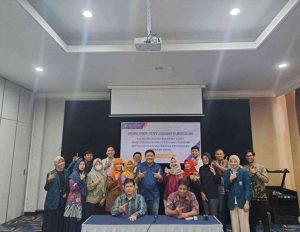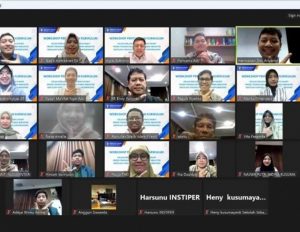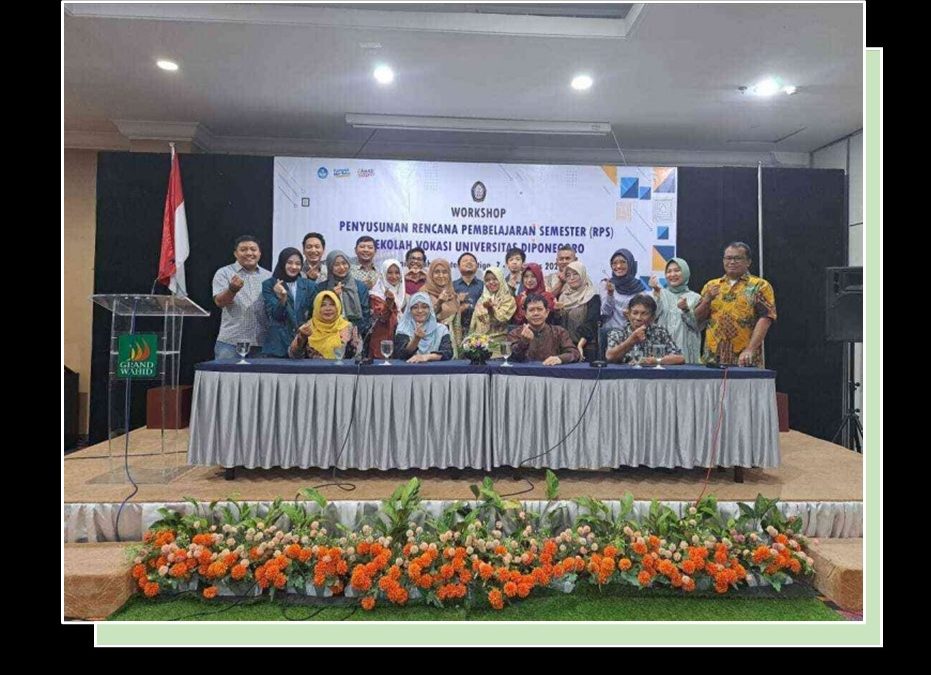Salatiga, August 7-8, 2024– Diponegoro University Vocational School (SV UNDIP) successfully held a curriculum development workshop for the Industrial Chemical Engineering Technology (TRKI) Study Program at Graha Wahid Salatiga. The two-day event aims to improve the quality of education and adapt the curriculum to the needs of industry 4.0. On the first day, August 7, 2024, the workshop began by discussing the TRKI study program learning design delivered by Mr. Endy Julianto, S.T., M.T., as the Head of the TRKI Study Program. He explained the importance of developing a curriculum that is in line with the Indonesian National Work Competency Standards (SKKNI) and Semester Learning Plans (RPS). The emphasis on developing a curriculum that is in accordance with SKKNI is expected to strengthen the relationship between the material taught and the needs of the industrial world. In a world that continues to change rapidly, universities are required to produce graduates who not only have strong knowledge, but also have skills that are relevant to the needs of the job market. With that, Mr. Endy also emphasized the need for an effective collaboration strategy with industry to improve the quality of education in the TRKI Study Program, as well as to prepare for the opening of double degree Masters and Doctoral programs in the future and prepare students to face future challenges.


The next material was presented by Prof. Budi, Dean of the UNDIP Vocational School, who discussed the preparation of RPS based on Outcome-Based Education (OBE). Prof. Budi explained how the curriculum should be evaluated and adjusted to industry needs to ensure that graduates have relevant skills. This explanation was followed by Ms. Anafil Wyndria S.E., M.Acc., who provided in-depth insight into the effective RPS format and assessment of learning outcomes. Furthermore, the Third Material session by Mr. Harsunu Purwoto, M.Eng. from the INSTIPER Agriculture Program, discussed the strategy of “Producing Superior Human Resources for the Palm Oil Industry that are Globally Competitive in the Industrial Era 4.0.” Mr. Harsunu emphasized the adjustment of the curriculum to industry needs and the importance of cooperation with companies in providing field practice and internships, providing an overview of how a relevant curriculum supports student readiness in the global market. Investment in human resource development is a long-term investment that will provide great benefits for the palm oil industry and the country.
In the final session of the first day, the Fourth Material by Mr. Agus Sutrisno, S.P., M.M. from PT Bumitama Gunajaya Agro, discussed “Curriculum Design for Palm Oil Industry Processing Based on SKKNI.” Mr. Agus explained the impact of supply and demand factors on the palm oil industry and company support in academic activities, emphasizing the importance of understanding the industry for students’ career success. The conclusion of the fourth speaker is that the curriculum design for palm oil industry processing based on SKKNI is an important step to produce graduates who are ready to work and able to contribute to the development of a sustainable palm oil industry. With a quality curriculum, the TRKI Study Program can produce superior human resources who are able to compete at the global level. The second day, August 8, 2024, began with the Fifth Material, which was the closing of the workshop delivered by Mrs. Ida, Deputy Dean 1. She explained the latest policies in the curriculum, including changes to the silver policy that allows students with a C grade to graduate cum laude. In addition, the new curriculum includes 1 credit of English for three consecutive semesters with a target of TOEFL certificate in the fourth semester. KKN is now an elective course in accordance with SKNI and SPMI policy. Ms. Ida also explained the restructuring of lecturers to ensure the effectiveness of teaching in the fields of oleochemistry, oleofood, and separation techniques.
Competency-based curriculum is an approach that emphasizes the mastery of competencies needed by graduates. This workshop discusses the steps in designing and developing an effective competency-based curriculum, as well as how to ensure that graduates have competencies that are in accordance with industry standards. With comprehensive delivery of materials and integration of various perspectives, this workshop is expected to strengthen cooperation with industry, open up internship and field practice opportunities, and continue to improve the quality of education in the TRKI SV UNDIP Study Program, so that graduates can compete effectively at the national and international levels. [Contributor: Najwa]


Recent Comments